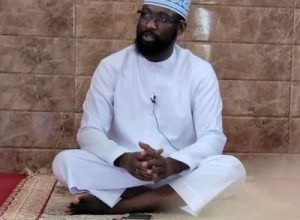
Sleep is a vital component of life and a means of recharging your energies so that you can carry out your everyday tasks.
The embedded video below is the way Prophet Muhammad Sleeps watch it;
Sleep is essential for maintaining both physical and mental health, as well as supporting brain function, whether you’re sleeping for the night or just taking a little nap.
During sleep, there is a decrease in both mental and physical activity, altered consciousness, and some inhibition of sensory activity. Both muscular activity and interactions with the environment decrease while we sleep. Sleep is more reactive than a coma or disorders of consciousness, even if it differs from waking in that it still contains active brain patterns.
Islamic Perspective On Sleep
Islam believes that sleep is necessary for optimal functioning, however in order to sleep in a devout and tranquil manner, there are rules and customs that must be followed.
Everyone can agree that getting enough sleep is important for your health. Teenagers should sleep for ten hours every night, while adults should aim for at least eight. Islam promotes getting enough sleep since it has numerous detrimental impacts and is necessary for a person to be able to operate securely during the day.
One of the Prophet’s companions, Ibn Amr, was praying all night when the Prophet (peace be upon him) urged him to “offer prayers and also sleep at night, as your body has a right on you.
Hadiths On Sleep
“Anyone among you who feels sleepy during prayer should go to bed (sleep) till his slumber is over,” the Prophet (peace be upon him) commanded. [Sahih Bukhari 210]
The Prophet’s (peace be upon him) wife Aisha tells of a woman who was seated with her who belonged to the Bani Asad tribe. “Who is this?” asked the Prophet (peace be upon him) as he approached. Aisha answered, “She is ___. She is praying at night, so she doesn’t get any sleep.” “Do (good) deeds which are within your capacity as Allah never gets tired of giving rewards until you get tired of doing good deeds,” the Prophet remarked with disapproval. [Ahmed Musnad 25244]
It’s not always necessary to sleep during the night. Throughout the day, taking quick naps might help you stay energised and carry out your activities as planned. Naps should last no longer than 15 to 30 minutes because longer naps make you feel sleepy when you wake up.
After Salatul Dhuhr in the afternoon, napping is Sunnah. Many hadiths from this era mention the Prophet Muhammad (peace be upon him) and his companions napping.
In some narration, it was said that Prophet SAW says You get a reward for Napping in between Salaatul Dhuhr and ASR.
Performing Ablution Before Sleep
An Islamic ritual called wudu (ablution) involves washing specific body areas with water to achieve cleansing. Although it is customary to complete it prior to praying (Salah), it is also Sunnah to do it before going to bed. “Perform Wudu [like you do] for Salah (prayer) whenever you intend to go to bed,” stated the Messenger of Allah (peace be upon him). [Muslim and Bukhari]
Al-Bara ‘bin \Azib narrated: “The Prophet SAW told me that every time you go to bed, make the same ablution for the prayer, sleep on your right side, and say, “Allahumma aslamtu wajhi ilaika, wa fauwadtu `Amri ilaika, wa alja’tu Zahri ilaika raghbatan wa rahbatan ilaika. La Malja’a wa la manja minka illa ilaika. Allahumma amantu bikitabika-l-ladhi anzalta wa bina-biyika-l ladhi arsalta”
Translation Of The Dua
“Almighty Allah! With both hope and trepidation, I give myself to You, submit all of my affairs to You, and rely on You for Your Blessings. There is nowhere else to run but to You, O Allah, for there is no other haven of refuge and shelter! I have faith in the revelation of Your Book, the Qur’an, and in Your appointed Prophet, Muhammad”
Then, if you pass away that same evening, you will pass away in faith (that is, in accordance with Islam).
Al-Bukhari’s Sahih 247.
The Prophet (peace be upon him) is reported by Salman al-Farisi to have said, “… sleeping in a state of wudu is equal to standing up the entire night in prayers.”
Observing Salah Before Sleep
For many Muslims, there is solace in remembering Allah after a long and hard day. Remember to offer Salatul-Isha, the final and fifth required prayer of the day.[9] You can offer two to twelve rak’at prayers for Salatul Tahajjud during the night. This is a voluntary Sunnah prayer that is referred to as the night prayer. The Prophet Muhammad (peace be upon him) said: “In Paradise, there is a castle reserved for those who perform Tahajjud Salah.” While you are not in sin for skipping Tahajjud prayer, it is strongly advised.
The Prophet (peace be upon him) was asked by a man, “How are the night prayers done?” “Two by two, then, when you feel that dawn is near, pray Witr with one rak’ah,” he commanded. Al-Bukhaari narrates. Regarding al-Fath, 3/20.
Witr prayer is a sunnah that is stressed. Even though missing it won’t hurt you, adhering to it will bring you many benefits.
As stated by Sayyidunā ‘Ali ibn Abī Ṭālib in a ḥadīth narrated by Imām Abū Dāwūd, the Prophet ṣallā Allāhu ‘alayhi wa sallam states:
“Observe the witr, you who follow the Qur’an; Allah is single (witr) and loves what is single.”
Furthermore, the Prophet Muhammad Sallā Allāhu ‘alayhi wa sallam never skipped witr, one of the optional prayers. He would make every effort to observe it. Whether he was traveling or at home.
What To Recite Before Sleep
There are Numerous Dua and Verses of the holy Qur’an mentioned by The prophet SAW to recite before sleeping which are:
Ayatul Kursiy
“What did your prisoner do yesterday?” inquired the Apostle of Allah. “He said he would teach me some words that will benefit me from Allah, so I let him go,” I retorted. Almighty Muhammad (ﷺ) inquired, “What are they?” “Whenever you go to bed, recite Ayat-al-Kursi from beginning to end
“Allahu laaa ilaaha illaa huwal haiyul qai-yoom; laa taakhuzuhoo sinatunw wa laa nawm; lahoo maa fissamaawaati wa maa fil ard; man zallazee yashfa’u indahooo illaa be iznih; ya’lamu maa baina aideehim wa maa khalfahum; wa laa yuheetoona beshai ‘immin ‘ilmihee illa be maa shaaaa; wasi’a kursiyyuhus samaa waati wal arda wa la ya’ooduho hifzuhumaa; wa huwal aliyyul ‘azeem” he instructed me, to which I answered. “(If you do so), Allah will appoint a guard for you who will stay with you, and no satan will come near you until morning,” he continued to say to me. “He is an absolute liar, but he really spoke the truth,” declared the Prophet (ﷺ). O Abu Huraira, do you realise to whom you were speaking these last three evenings? “No,” Abu Huraira replied. Says he was Shaytaan. Sahih Bukhari 2311.
Suratul Mulk
The Quran contains a surah that is only thirty verses long. The Prophet (SAW) further stated, “Surah al Mulk is the protector from the torment of the grave” [Sahihul Jamiea 1/680, Hakim 2/498 & Nasai]. It (Surah al Mulk) protected the one who repeated it till it took him to Paradise.” [Sahihul Jamiea 1/680, Tabrani in Al-Awsat & Ibn Mardawaith, Fath al Qadir 5/257].
Suratul Ikhlas, Falaq and Nas
Aisha related a story about how the Prophet (peace be upon him) would recite Qul Huwa Allaahu Ahad (Surah Al-Ikhlas), Qul a’oodhu bi rabb il-falaq (Surah Al-Falaq), and Qul a’oodhu bi rabb il-naas (Surah-An Nas) into his hands as he went to sleep each night. Then, he would wipe them throughout his body as much as he could, doing so three times, beginning with his head, face, and front portion of his body. [Bukhari]
Suratul Kafiroon
The Messenger of Allah (peace be upon him) reportedly told Nawfal al-Ashja’i to recite Qul yaa ayyuha’l-kaafiroon (Surah Al-Kafiroon) before going to bed since doing so is a disavowal of shirk. [Dawood Abu and al-Tirmidhi]
Duas
During this time, you are welcome to offer du’a for anything you would like, although the typical sleeping Dua is Allahumma bismika amutu wa ahya. means ‘Yaa Allah, with Your name I die and live’.
Allaahumma qinee ‘athaabaka yawma tab’athu ‘ibaadaka it means. Yaa Allah, save me from Your punishment on the Day that You resurrect Your slaves.
Sleeping Position In Islam
Sleeping facing the Qibla on your right side is Sunnah. Upon going to sleep, the Prophet Muhammad (peace be upon him) would turn over on his right side and place his right hand beneath his right cheek.
Islam forbids sleeping on one’s stomach since Shaytaan does not sleep in this manner. Upon witnessing a guy lying on his stomach, Allah’s Messenger (peace be upon him) declared, “This is a method of lying down which Allah does not like.”Additionally, it has been demonstrated that sleeping on your stomach is unhealthy and can result in neck pain and/or temporal dyspnea.
It is quite OK to sleep in positions other than your stomach, such as on your back, right or left side (though it is Sunnah to sleep on the right), or any combination of these.
CAN I SLEEP NAKED?
Short answer: NO
Explanation
Every Muslim is required to cover their body at all times, with the exception of situations where it is absolutely necessary, like taking a bath, having sex, getting checked out, etc. All of the Islamic scholars hold this opinion.
The following hadīth, attributed to Mu’āwiyah bn Haydah AlQushayrī, provides proof for this: said, “O Messenger of Allāh, with regard to our nakedness, what may we uncover of it and what must we conceal?
He said: “Cover your nakedness except from your wife and those whom your right hand possesses (i.e., concubines).”
I said, “O Messenger of Allāh, what if the people live close together?”
He said, “If you can make sure that no one sees it, then do not let anyone see it.”
I said, “O Messenger of Allāh, what if one of us is alone?”
“Allāh is more deserving that you should feel shy before Him than people.”
Regarding this hadīth, Shaykh bn Taimiyah رحمه الله commented, saying: He (the Prophet) commanded that one cover one’s nudity even when spending time by oneself in isolation. The majority of scholars believe that this is an obligatory act.
Sleeping Naked Conditions
To keep oneself from going to bed naked, one covers themselves with a cloth or duvet.
Since there is no concern about harassment or being seen in that state, it is safe to do so.
The intense heat of the upcoming dry period may make it impossible to sleep in garments. You can wear as little clothing as possible, but don’t go to bed completely nude.
Discover more from Labaran Yau
Subscribe to get the latest posts sent to your email.



















